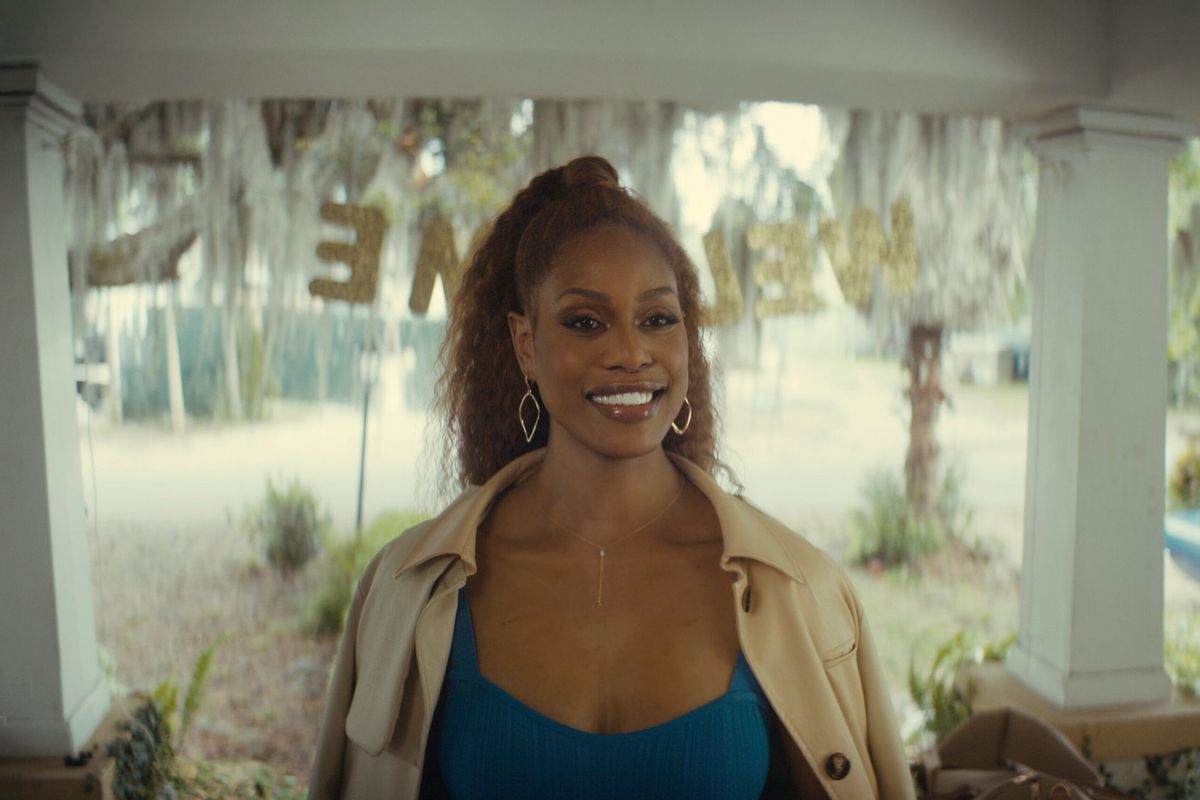From the moment car wash owner Harry Slate (George Wallace) rolls into the opening frames of “Clean Slate,” slowly gliding his classic convertible down the sunny treelined streets of his close-knit Alabama community, the audience knows they can relax.
This is a place where everyone knows everyone else and might find stuck-in-their-ways folks like Harry to be charming or crotchety. Regardless, they accept their neighbors as they are, as long as that acceptance is reciprocated.
That means that Harry’s child Desiree (Laverne Cox) should receive a soft landing when she returns home after 23 years without contacting him.
Maybe we understand that before she does since this homecoming tale starts with Harry processing the realization that the child he believed to be his son was, in fact, always his daughter.
Other comedies might make this an ongoing refrain. “Clean Slate” gives that facet of Desiree and Harry’s reunion the import it merits in the premiere, which is to say Harry is allowed his initial shock. But the blessing and relief is that Harry is never shown “getting over” or “getting past” this new information.
“I’m trying to roll with it. I’m trying,” Harry earnestly says — and we can see that, which is what makes Wallace’s performance so winning. At no point is Desiree’s identity presented in a way that clunks with “very special episode” messaging or talking points. Harry's task is to steadily comprehend, with Desiree’s patience and guidance, what it means for her to be her natural self.
Instead, “Clean Slate” sells palpable comfort. In past seasons, that description might have landed as a backhanded compliment — a “nice try” in the wake of some form-breaking comedy’s ascension as a critical darling. This was especially true after single-camera half-hours seized all the critical attention while reliable multi-cams did their thing without the benefit of pointy-headed celebration. (Just solid ratings.)
The late Norman Lear, who has a posthumous executive producer credit on “Clean Slate,” remained devoted to that format because of its assuring familiarity. He correctly wagered that allowing the audience to sit with one of his families inside their living space as they sort life challenges nurtures understanding and empathy.
This is not a queer story . . . It’s a community story with an endlessly amusing father and daughter as its engine.
Playing out that action within three physical walls and an invisible fourth allows us to wrap our heads and arms around heightened topics that, for many, may be conceptual. But this comedy forgoes a soundstage to invite us into a bubble within Mobile (by way of Savannah, GA., where the series was filmed), that feels equally intimate. Desiree’s family extends beyond Harry to include her best friend Louis (a winning performance by D.K. Uzoukwu) and his mother Ella (Telma Hopkins), with Harry’s employee Mack (Jay Wilkison) and his precocious daughter Opal (Norah Murphy) squeezing into her inner circle.
Cox co-created “Clean Slate” with Wallace and Dan Ewen, and their guiding hand in the comedy’s execution is subtle but unmistakable. The words “trans” or “transgender” are absent in the first couple of episodes, not out of a need to camouflage what the show is about but, rather, to reflect that this aspect of who Desiree is comprises a tiny part of the conversations she and Harry need to be having.
We need your help to stay independent
The writers recognize Desiree has larger concerns, like anyone else. She returns to Mobile after her dream of owning an art gallery in New York sours and her boyfriend betrays her. How quickly Harry learns to use the right pronouns is the least of her concerns. She’s broke, jobless and trying to figure out where to go next. Besides, the longer he struggles with it, the more cash she accrues in their version of a swear jar.
Episodes falling later in the season treat social and political topics with similar authenticity. There are moving subplots about voter suppression, coming out and the way Christian hypocrisy can sit in the same pew as churchgoers who are loving and kind. There’s messaging about neighbors with different political views co-existing amicably – or, if not that, detesting each other for reasons other than politics.
 Desiree (Laverne Cox) and Mack (Jay Wilkison) in "Clean Slate" (Courtesy of Prime)
Desiree (Laverne Cox) and Mack (Jay Wilkison) in "Clean Slate" (Courtesy of Prime)
Holding everything together are Wallace’s and Cox’s vibrant chemistry and comic timing. In an interview with Birmingham’s ABC affiliate, Wallace said he’d initially pitched Lear on rebooting “Sanford & Son.” Seeing Cox in “Orange Is the New Black” inspired him to approach her to collaborate on a new version of a story about a widower cohabiting with their adult child, one that replaces Fred Sanford’s all-purpose cantankerousness with acceptance and affection.
Desiree, meanwhile, lives out the same fears as other stories about big city transplants forced by a setback to boomerang home, in the same way that Desiree’s anguish and Harry’s bewilderment are offshoots of common, surmountable barriers between misfit adult children and their parent. One party feels insufficiently understood or loved while the other is baffled as to how they might have fallen short. They find common ground, ousting old clutter in the process. And Desiree reaffirms her appreciation for how far her hometown has come despite aching to return to New York — "a diverse, exciting woodchipper where everyone gets to wear scarves," she dreamily whispers to a curious Opal, a little girl dreaming about ending up someplace else, just like she was.
This is not a queer story, in other words. It’s a community story with an endlessly amusing father and daughter as its engine.
Want a daily wrap-up of all the news and commentary Salon has to offer? Subscribe to our morning newsletter, Crash Course.
Add the leavening of Lear’s style of humor executed by modern voices – nothing snide or so mean that another character can’t let it roll off their armor – and the culmination is an easy, welcoming space. Nobody in “Clean Slate” is snide, and the one or two who don’t act right aren’t rewarded with punchlines.
You may even pull for those wrongdoers to make a turnaround and, better, be warmed by the heroes’ refusal to be thwarted if they don’t. These qualities have often in the past been dismissed as maudlin pandering, which the thoughtful "Clean Slate” never is. Instead, it’s a realistic reassurance that most people are better and more loving souls than some TV channels and political leaders portray them to be. That’s not just comforting. It’s something we need to sit with for the sake of our collective well-being and sanity.
All eight episodes of “Clean Slate” are available to stream on Thursday, February 6 on Prime Video.



Shares